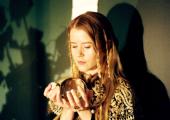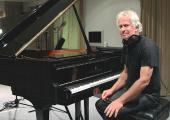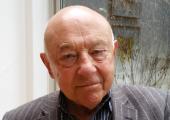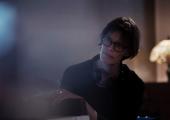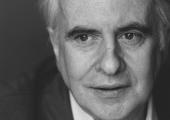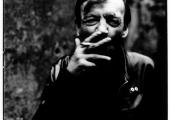10 Questions for Performer Seth Kriebel
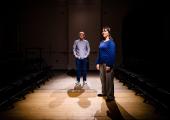
Rising star of the interactive theatrical experience explains where he's coming from and what he's up to
Seth Kriebel, 45, is a performer, much of whose work involves audience participation. He is bringing the show A House Repeated to the Brighton Festival 2018 between 6th and 11th May. Of American origin, born and raised near Philadelphia, Kriebel moved to the UK in 2001 and, over the last few years, has achieved increasing profile and success with shows such as Beowulf, The Unbuilt Room and We This Way.
THOMAS H GREEN: Was your background in the States arts-orientated?
SETH KRIEBEL: This is always difficult to try and contextualise for a British audience. Where I’m from is roughly equivalent to Lancashire, in that it’s full of straight-talking working people, so mine wasn’t a particularly arts and culture household, but it wasn’t anti that either. The arts just didn’t figure that much.
What pushed you in the direction your career went?
I should clarify that I don’t in any way consider myself to be an actor. Actors tend to pretend to be other people. They play a character whereas the first thing my co-performer, Zoe Bouras, and I do when we walk on stage is announce, “Hello, I’m Seth, hello, I’m Zoe” so we’re performing but we’re not acting. This particular show came out of the fact I liked games when I was a teenager in the early Eighties. I liked computer games before the era of graphics so it was all text. All of the action and environments happened in your imagination. It was very much like reading a book, but it was interactive and the consequences of your decisions would unfold. The show I’m bringing to the Brighton Festival is very directly an attempt to capture that experience live.
When you were in the States, were you also involved in performative arts?
Not so much. My training was actually in film, so I was in film and television. Then I met my wife, moved over to Brighton with her job, phased out the film and TV and moved into the arts. For nine years I ran a company, Rules and Regs, which produced residencies for artists, so they could develop and try new things. It tended to be towards the performance side, whether visual art or a painter doing whacky experimental stuff. That kind of crossed me into doing my own stuff.
What are your thoughts on Brighton?
I love it, a great place to live. I wouldn’t live anywhere else in the UK. There’s always lots of energy and lots of stuff going on. It doesn’t feel huge and overwhelming like London can, but it’s close enough to London so you can access all the world-class things London has. Locally we have loads of amazing things too, but it’s still a place you can walk across in about an hour, and you’re always bumping into people you know so it has a neighbourly feel, with the energy of a city.
How many nights a week do you hit the town, then?
Zero, because I have a child.
A baby?
Not any more, she’s actually shockingly old now. When I look at her I go “[SHRIEKS]” and say, “When did you grow up?” But I’m, just sort of emerging from that younger child cocoon.
What was your favourite vintage video game?
I knew you were going to ask that but I don’t have one because I always played these games at my friend’s house. I didn’t have a computer, so I don’t remember the names of these different games. I just remember that feeling of looking at live glowing green text on a black background and how that could evoke such an amazing world to explore.
There were also books where you could choose your own story, weren’t there?
Yes, I had loads of Choose Your Own Adventure books which I loved dearly. They gave you a slightly different sense of interaction. They gave you a choice of A, B and C, whereas in the games you could type in anything and only some would get a response in terms of advancing the narrative. It was really up to you to figure out what you were going to do. I must warn you against using the term Choose Your Own Adventure too freely. A few years ago a theatre used that phrase to promote a different show I was doing and got rapped over the knuckles by the American company who own the copyright. It’s a trademarked phrase.
If you could work with anyone on the planet and money was no object, who would it be?
One of the central ideas behind the company Rules and Regs was imposing restrictions on all artists and then finding creativity in working your way around those restrictions. Restrictions breed creativity. Necessity is the mother of invention. So in my own practice I’m very much a cut-my-coat-according-to-my-cloth kind of guy. Having said that, Brian Eno, a previous Guest Director of the Brighton Festival, is very interesting in that he was one of the architects of Oblique Strategies which is a restriction system where you pick a card and then let that influence your artistic process, so he’d be quite fun to try something with.
You say you’re not an actor but your performance bears relation to stand-up, right?
Yeah, it’s not dissimilar to that. There isn’t a culture of storytelling outside of that for children. So I try to avoid using the word “storyteller” which, in a way, is what a stand-up comedian is, except all their stories are skewed for laughs. When we view something live that’s not comedy it tends to go into this narrative tradition – “I’m going to pretend to be a soldier” or whatever – so somewhere in that cultural gap I tend to sit, storytelling not for children. Like any story it depends very much on the audience. I’ve formalised that. Instead of just tailoring my delivery I actually ask the audience, “Ok what do you want to do now?”
The word storytelling also has connotations of hippies at festivals…
This is why I avoid that word, because it either conjurs a nice guy who’s going to really entertain a six-year-old, or kind of “Hey, man, let’s all sit cross-legged in a circle and just work things out”. Cool if that’s what you’re into but this is something completely different.
So what is it?
A House Repeated is one of those things that makes perfect sense when you’re there. It’s super-easy to understand, but whenever I do any press or write publicity copy it’s difficult to communicate quickly. Without trying to be pithy, here’s how it works. Zoe and I are standing on a bare stage between two banks of audience, so the audience is seated traverse, one half of the audience is facing the other half, and we’re in the middle. After the intro and all that, I turn to my half and I describe a place: “Imagine you’re standing outside. In front of you is a building.” That kind of thing. Then I give some options about where they might go and ask them what they’d like to do: “You can go through the door; you can go upstairs?” Go upstairs. Turn to another another member of the audience: “In that room you’ll find this.” Maybe there’s a bottle on the table, what do they want to do? They can interact. Zoe’s audience are also giving her instructions as to how to explore this imaginary environment. Now, as they navigate their way through, maybe a narrative or an implied narrative starts to unfold. Two different audiences are each controlling a different explorer, an avatar, and might see what the relationship is between them. That kind of thing. It’s hard to get that down in less than 50 words for a brochure.
What was the last thing you saw at the theatre?
Last night when I was in a show! Actually, it’s been a very busy beginning of the year where I’ve been performing a lot myself so the last thing I saw was A Christmas Carol at The Spire in Brighton, a church converted into an arts centre. My family were over from the States so we all went and it was a really enjoyable seasonal thing to do.


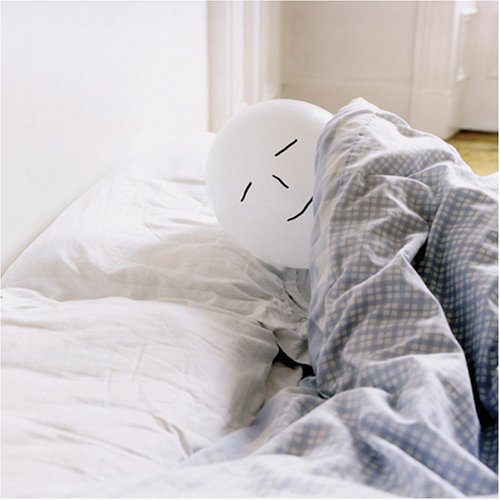 What are your plans for the Brighton Festival show?
What are your plans for the Brighton Festival show?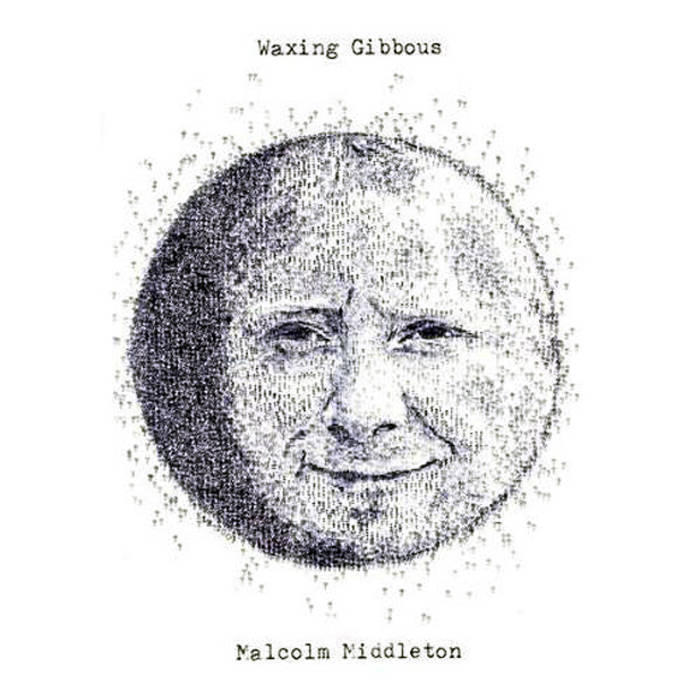 I’m not sure that’s possible. The songs don’t have that vibe where they could be played at family fun days. I don’t have a repertoire of happy songs so people sometimes book me but then look at me as if to say, “Why are you playing these songs?” while I just think, these are the songs that I write. I can’t imagine there being any need for a musical or it being that popular. You think of a musical being something to go and see and enjoy and I don’t think my songs are about enjoyment. Maybe some of the songs… maybe you could look into that and come back to me…
I’m not sure that’s possible. The songs don’t have that vibe where they could be played at family fun days. I don’t have a repertoire of happy songs so people sometimes book me but then look at me as if to say, “Why are you playing these songs?” while I just think, these are the songs that I write. I can’t imagine there being any need for a musical or it being that popular. You think of a musical being something to go and see and enjoy and I don’t think my songs are about enjoyment. Maybe some of the songs… maybe you could look into that and come back to me…